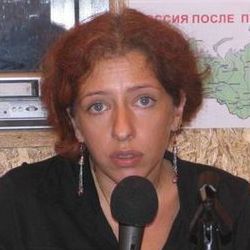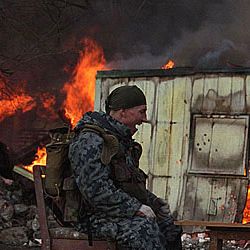An international human rights organization Human Rights Watch demands Russian federal and Chechen local authorities should immediately put a stop to the punitive house-burning and other human rights violations in the Chechen Republic and bring those responsible to justice. Human Rights Watch has documented two new cases in the Chechen Republic in which the homes of families related to suspected insurgents were torched by local law-enforcement officials as well as a public extrajudicial killing of a man suspected of providing food to insurgents.
 "We have two more houses burned and at least one person killed just in the last couple of weeks," said Tanya Lokshina, deputy Moscow director (left) at Human Rights Watch. "It’s time for Russia’s leaders to take a clear stand against this kind of brutal collective punishment instead of looking like they endorse it."
"We have two more houses burned and at least one person killed just in the last couple of weeks," said Tanya Lokshina, deputy Moscow director (left) at Human Rights Watch. "It’s time for Russia’s leaders to take a clear stand against this kind of brutal collective punishment instead of looking like they endorse it."
The two new cases of punitive house burnings documented by Human Rights Watch took place on June 29 and July 4, after the Kremlin gave Chechnya’s president, Ramzan Kadyrov, authority to run counterinsurgency operations outside the Chechen Republic, in neighboring Ingushetia.
In the first new episode, Chechen law-enforcement personnel arrested 39- year-old Magomed Dadilov at his home in Shali on the evening of June 28. A relative told Human Rights Watch that four law-enforcement officers came for Dadilov when he was reciting his evening prayers and provided neither an arrest warrant nor an explanation for his arrest.
Witnesses told Human Rights Watch that at dawn the next day, a group of suspected Chechen law-enforcement personnel in masks and camouflage broke into the Dadilov family compound, locked all the family members inside one of the three houses on the compound, doused one of the other houses with gasoline, and set it on fire.
Soon after the house was fully ablaze, the perpetrators left.
"The burning of this home fits the unmistakable, ghastly pattern that we and other groups have been documenting for some time," said Lokshina.
Dadilov was detained incommunicado for three days, and then taken to the Shali district police department on July 1, where his detention was officially processed.
In the July 4 incident, armed law-enforcement personnel in Argun burned the home of the Yunusovs, whose 20-year-old daughter, Madina, recently married a man accused of involvement in the insurgency in the Chechen Republic.
Two days earlier, on July 2, Madina Yunusova had been critically wounded in a special operation carried out by Chechen law-enforcement agencies in a house where she was staying in Staraya Sunzha, a village on the outskirts of Grozny. The law-enforcement personnel surrounded the home and killed Said-Selim Abdulkadyrov, alleged to be her husband.
Chechen law-enforcement agencies said that Abdulkadyrov was involved in a plot to assassinate Ramzan Kadyrov. Yunusova was taken into custody, placed under surveillance in a prison-type room of a hospital in Grozny, and reportedly underwent successful surgery for her wounds. However, she died under suspicious circumstances less than three days later.
"This is clearly a suspicious death, which needs to be fully investigated," said Lokshina.
Human Rights Watch also documented the extrajudicial killing of Abusubyan (Rizvan) Albekov, on July 7 in the village of Akhinchu-Borzoi in Kurchaloi district. The man was supposedly accused of selling food to the rebels.
Currently, European Court of Human Rights found Russian authorities responsible for human rights violations in more then 100 cases in the Chechen Republic. Human Rights Watch calls Russian federation to provide an execution of the Court’s decisions.
“Proper execution of the European Court’s decisions is one of the means to put an end to impunity in Chechnya”, Lokshina said. “In conditions of inevitability of punishment such crimes as punitive house-burnings are practically impossible.





